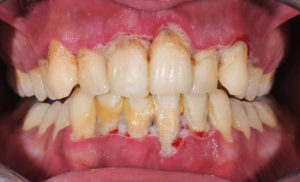 There’s ample evidence supporting the mouth and body connection. Various dental issues can increase your risk of health conditions and vice versa. However, a new study by the American Academy of Neurology has found that your dental health can affect your brain health negatively. Gum disease and tooth loss can cause brain shrinkage in the hippocampus, which can increase your risk of Alzheimer’s. Here’s what you need to know to keep your mouth and brain healthy.
There’s ample evidence supporting the mouth and body connection. Various dental issues can increase your risk of health conditions and vice versa. However, a new study by the American Academy of Neurology has found that your dental health can affect your brain health negatively. Gum disease and tooth loss can cause brain shrinkage in the hippocampus, which can increase your risk of Alzheimer’s. Here’s what you need to know to keep your mouth and brain healthy.
Half of Americans Have Gum Disease
Tooth decay isn’t the only contributor to poor oral health. Gum disease is equally devastating. The infection is caused by bacteria in plaque and tartar buildup from subpar brushing and flossing habits. According to the Centers for Disease Control and Prevention, at least 50% of adults over the age of 30 have gum disease.
Gingivitis is the first stage, which causes red, swollen, and bleeding gums. At this point, it is easy to treat with a deep cleaning and changes to your oral hygiene routine. However, with no treatment, gingivitis can progress to advanced periodontitis, which can cause tooth loss and harm your health.
Gum Disease and Brain Health
Researchers have linked tooth loss and gum disease to a decrease in the volume of the hippocampus. According to the study, mild gum disease causes a 3-4 millimeters reduction in volume while severe cases experience a 5-6 millimeters of hippocampus loss.
When gum disease coincides with tooth loss, the rate of shrinkage increases. Researchers concluded that patients with severe gum disease and 1 or more missing teeth had an increased brain age of 1.3 years. Controlling advanced gum disease is essential for reducing the progression of brain atrophy.
Memory loss isn’t the only concern. Gum disease has been linked to an increased risk of heart disease, diabetic complications, preterm delivery, and low birth weights.
Tooth loss can also harm your wellness. Every tooth is important for your oral functions. The more teeth you lose, the more difficult it is to maintain a nutritious diet. As certain foods become too difficult to chew, you may eliminate them from your diet, which can lead to nutritional deficiencies.
Support Your Gum Health
Thankfully, it’s easy to keep gum disease at bay. Besides brushing your teeth twice daily, floss every day. Flossing removes accumulations your toothbrush can’t reach. Finish your oral hygiene routine with an antimicrobial mouthwash to kill any remaining bacteria.
Don’t forget to visit your dentist every 6 months for a cleaning and checkup. If you notice any signs of gum disease between your regular appointments, contact your dentist for an appointment.
About Dr. Lauri Barge
Dr. Barge achieved her dental degree from the Texas A&M College of Dentistry and has regularly continued her education to provide advanced services, like restorative dentistry and gum disease therapy. She holds active memberships with the American Dental Association and many other professional organizations. Request an appointment through her website or call her office at (972) 777-6687.
